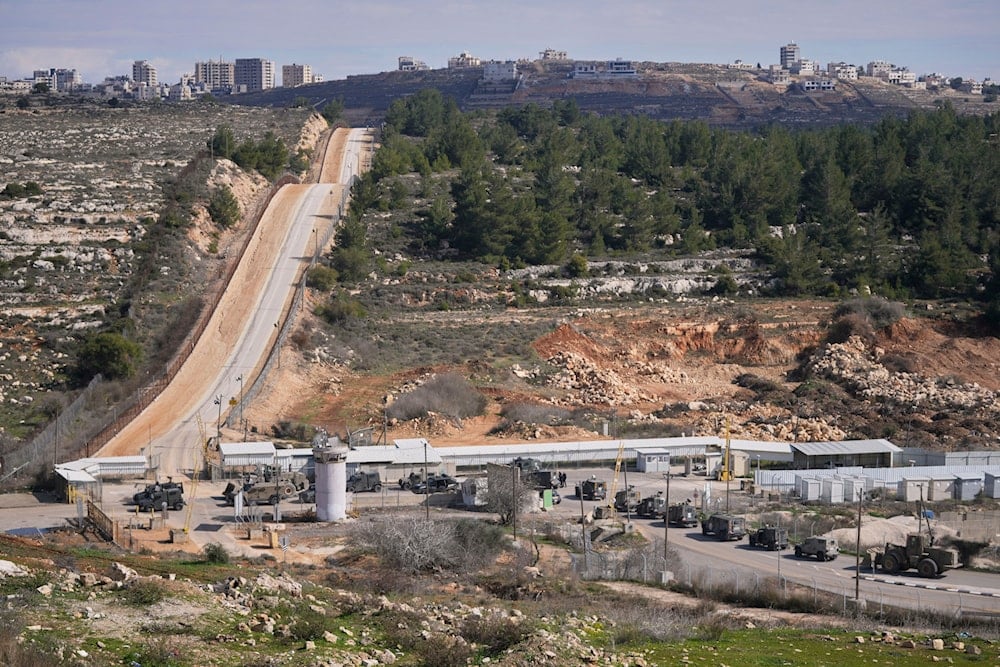Administrative detainees comprise 32% of total prison population: PPS
The Palestinian Prisoners' Society reports record use of administrative detention in "Israel", with over 3,500 detainees, including women, children, and journalists.
-

Military vehicles are lined up at the Israeli Ofer prison in the West Bank city of Beitunia, on Saturday, Jan. 25, 2025 (AP)
The Palestinian Prisoners' Society (PPS) stated that Israeli authorities are pursuing an unprecedented escalation in their use of administrative detention.
"Since the start of the war, this policy has become a primary tool, causing a major shift in the number of detainees in Israeli prisons," the Prisoners' Society statement read. It noted that those held under administrative detention now represent the highest percentage (32%) of all prisoners, surpassing those who are detained, sentenced, or classified as "unlawful combatants".
According to the PPS, the total number of those detained in "Israel" is more than 11,000 at the start of September 2025, with 3,577 of them being administrative detainees, including women and children.
The statement further pointed out that, over the past two weeks, the occupation authorities have re-detained dozens of individuals under administrative detention orders, among them former detainees who had previously spent years in administrative detention and were released only months ago.
It emphasized that the occupation's military courts continue to play their role in entrenching this policy. Their decisions, which rely entirely on the orders of the occupation's intelligence services and their sham trials, represent the true purpose for which these courts were established.
Journalists key group targeted with administrative detentions
The Palestinian Prisoners' Society also highlighted that journalists remain one of the key groups targeted by the occupation's administrative detention policy.
It noted that the occupation recently re-detained journalists Mu'az Amarna and Asid Amarna from Beit Lahm, holding them under administrative detention. The occupation's intelligence services issued a four-month order for Mu'az and a six-month order for Asid, both of whom had previously been imprisoned and released.
According to the PPS' statistics, since October 7, there have been more than 197 cases of detention targeting journalists, and 54 of them remain detained. 49 of them were arrested after the war on Gaza began, while 5 of them were arrested before that.
Detainees face humiliation, assaults, and neglect
In this context, the Prisoners' Society reported, based on a visit to journalist Ali Samoudi in the Negev prison, that he is suffering from deteriorating health conditions and harsh detention circumstances like other prisoners.
Samoudi explained that since being transferred to Negev several months ago, he has been forced to wear the same clothes and that he fell during the prisoners' break, resulting in a head injury.
He also indicated that he was subjected to maltreatment and assault during the process of his detention and his transfer from Megiddo prison to the Negev prison, where his glasses were deliberately broken, adding that he suffers from the effects of an old injury dating back to the instance when journalist Shireen Abu Akleh was killed, in addition to other health problems.
Furthermore, journalist Mu'az Amarna, previously detained during the war and released just months ago, faces ongoing health struggles. These include diabetes and complications from a serious injury from when journalist Shirine Akleh was killed, where he was shot by occupation forces while reporting, an attack that cost him an eye and left a bullet fragment lodged in his brain.
The PPS concluded its statement by asserting that detained journalists face systematic abuse, including torture, medical neglect, and deliberate humiliation, mirroring the broader violations against Palestinian detainees and prisoners.
This systematic targeting, particularly of journalists, is an extension of the ongoing war and represents a deliberate attempt to silence Palestinian voices and suppress the narrative exposing "Israel's" crimes in Gaza.

 4 Min Read
4 Min Read










